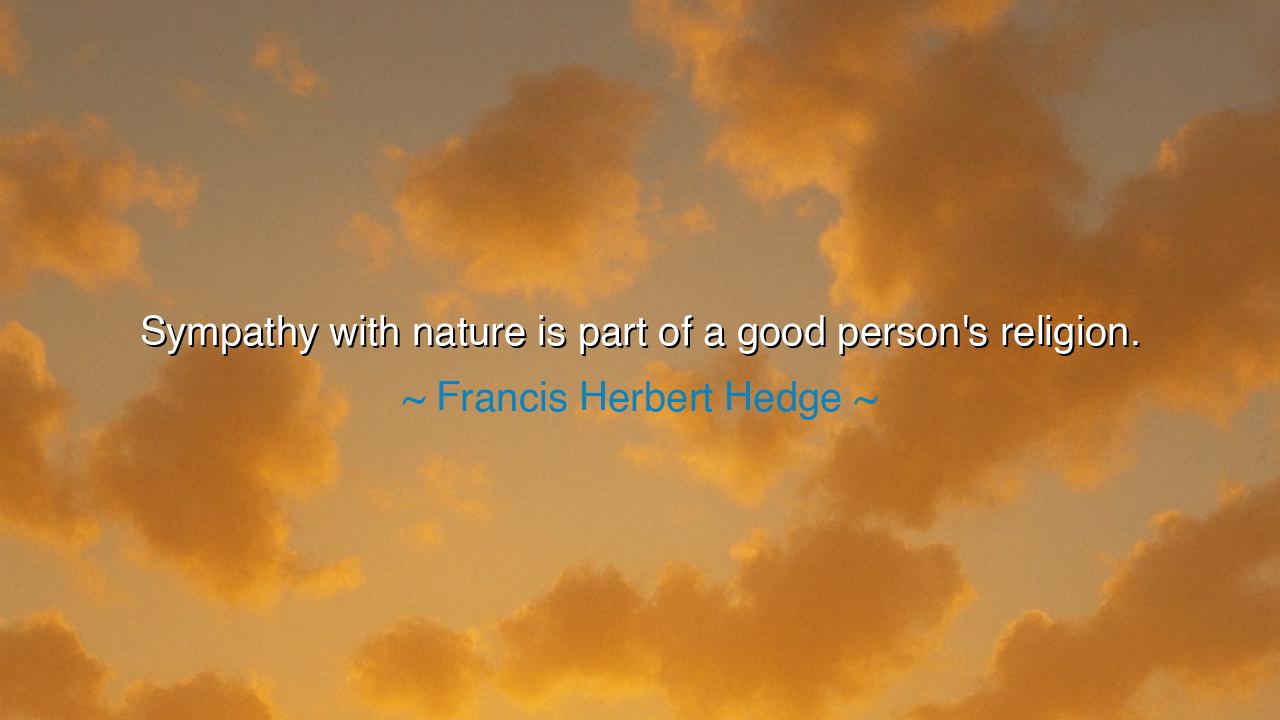
Sympathy with nature is part of a good person's religion.






Hear the words of Francis Herbert Hedge, philosopher and voice of the Transcendentalist spirit, who declared: “Sympathy with nature is part of a good person’s religion.” In this utterance, he gives shape to a truth as ancient as the hills and rivers: that goodness is not only measured by our dealings with humankind, but also by the reverence we show to the earth beneath our feet and the skies above our heads. For he teaches that the sacred is not confined to temples and scriptures—it dwells in the forests, the seas, and the stars, waiting for the soul that will listen.
To speak of sympathy with nature is to speak of kinship. It is the recognition that we are not masters over the world, but children within it. The good person does not trample the soil as though it were dead matter, but touches it with care, knowing that it pulses with life. Hedge and his fellow Transcendentalists—Emerson, Thoreau, and others—saw in the woods and rivers a living scripture, a divine text written not in words but in wind, in bird-song, in the rustle of leaves. To be in sympathy with such things was, to them, as holy as any prayer.
The origin of this teaching comes from a time when America was growing in industry and power, when cities began to rise and the machine threatened to silence the voice of the earth. Hedge, like his companions, reminded men that to lose touch with nature was to lose touch with the sacred. He saw clearly that without reverence for the natural world, religion becomes hollow ritual, severed from the very breath of life. Thus he placed nature at the heart of morality itself, declaring that no good soul can ignore its call.
History gives us confirmation of this truth. Consider St. Francis of Assisi, who called the sun his brother and the moon his sister, who preached to the birds, and who saw in every creature a reflection of the divine. His religion was not only of church and cross, but of field and forest. And because of his sympathy with nature, he became a beacon of humility and goodness, remembered not only as a saint of faith but as a guardian of creation. His life shows us that reverence for nature is not separate from holiness—it is its companion.
The deeper meaning is this: one who lacks sympathy with nature may still practice rituals, chant prayers, or study doctrine, but their heart remains incomplete. For the heart that does not tremble at the beauty of a sunrise, that does not grieve at the destruction of a forest, that does not rejoice at the blossoming of spring, is a heart cut off from the source of life itself. Hedge teaches us that to be truly good is to feel with all living things, to extend compassion not only to man but to the world that sustains him.
Beloved listener, take this teaching into your life. Go into the woods or the garden, and listen. Feel the earth beneath your feet, and let it remind you of your kinship with all creatures. Guard the rivers, for they are your own veins; protect the air, for it is your own breath. To live in sympathy with nature is not only to save the earth, but to save yourself, for your spirit is woven into the same fabric as the trees, the waters, and the stars.
Therefore, let your religion be not only words and rites, but also care and reverence for the world around you. Plant where others uproot, heal where others destroy, and delight where others are blind. In this way, your goodness will be complete, your soul attuned not only to heaven but also to earth.
Thus the wisdom of Francis Herbert Hedge endures: that sympathy with nature is no ornament to faith, but its foundation. The good person knows that to honor creation is to honor the Creator, and to live in harmony with the earth is to live in harmony with the divine. Let this truth be carried in your heart, as eternal as the mountains and as tender as the whisper of leaves in the wind.






AAdministratorAdministrator
Welcome, honored guests. Please leave a comment, we will respond soon